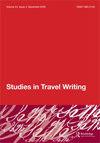巴索斯:荒谬的普通旅行的文学吸引力
Q2 Arts and Humanities
引用次数: 0
摘要
摘要在二十世纪上半叶,最常见的是在南北战争时期,许多英国作家为失落的旅行艺术写下了颂词,似乎通过描绘真实旅行的消亡来吸引悲情,因为寻找未绘制地图的领土的可能性似乎已经减少。然而,尽管宿命论盛行,但旅行写作不仅经久不衰,而且蓬勃发展,而且这种类型矛盾地找到了所谓的复兴。本文比较了这一时期不同的旅行作家(彼得·弗莱明、伊夫林·沃、格雷厄姆·格林和乔治·奥威尔),探讨了巴托斯在这一时期的吸引力,当时旅行写作越来越充满反高潮、幻灭和消极。出现的是一种新型的例外,不可避免的平凡突破了荒谬的界限,在国外的无聊经历似乎是一种新的启蒙形式。本文章由计算机程序翻译,如有差异,请以英文原文为准。
Bathos: the literary appeal of absurdly ordinary travel
ABSTRACT During the first half of the twentieth century, and most frequently during the Interwar period, many British writers wrote eulogies to the lost art of travel, seemingly appealing to pathos by depicting the demise of authentic travel as the possibility of finding unmapped territories seemed to have dwindled away. Yet, while fatalism abounded, travel writing did not only endure but prospered, and the genre paradoxically found a so-called renaissance. Comparing different travel writers of the period (Peter Fleming, Evelyn Waugh, Graham Greene and George Orwell), this article discusses the appeal of bathos at that period of time, when travel writing became increasingly imbued with anti-climax, disillusionment and negativity. What emerged was a new type of exceptionality, as inescapable ordinariness pushed the boundaries of absurdity, and the experience of boredom abroad seemed a new form of initiation.
求助全文
通过发布文献求助,成功后即可免费获取论文全文。
去求助
来源期刊

Studies in Travel Writing
Arts and Humanities-Literature and Literary Theory
CiteScore
0.40
自引率
0.00%
发文量
13
期刊介绍:
Founded in 1997 by Tim Youngs, Studies in Travel Writing is an international, refereed journal dedicated to research on travel texts and to scholarly approaches to them. Unrestricted by period or region of study, the journal allows for specific contexts of travel writing to be established and for the application of a range of scholarly and critical approaches. It welcomes contributions from within, between or across academic disciplines; from senior scholars and from those at the start of their careers. It also publishes original interviews with travel writers, special themed issues, and book reviews.
 求助内容:
求助内容: 应助结果提醒方式:
应助结果提醒方式:


